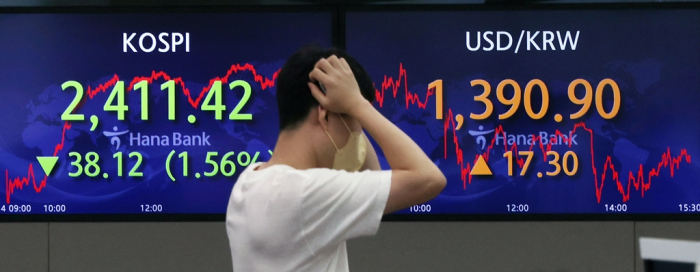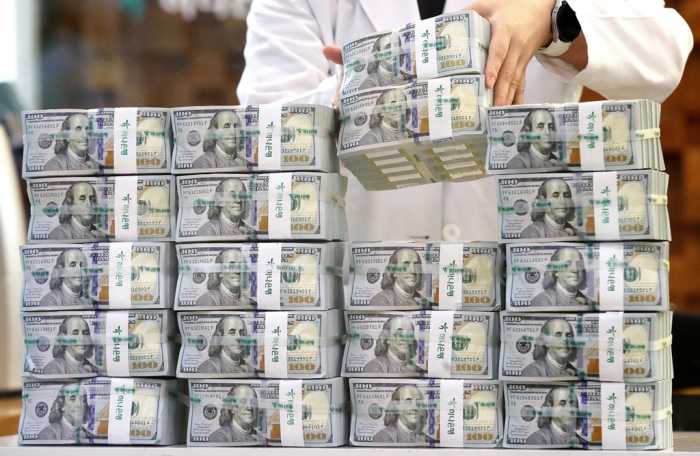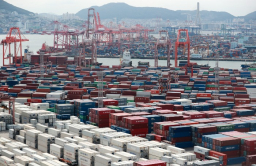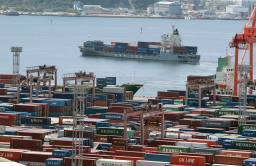-
KOSPI 2812.05 +41.21 +1.49%
-
KOSDAQ 756.23 +6.02 +0.80%
-
KOSPI200 376.54 +6.64 +1.80%
-
USD/KRW 1373 3.00 -0.22%
Tumbling Korean won increases corporate debt burden
Foreign exchange
Tumbling Korean won increases corporate debt burden
Non-financial companies’ FX debts at record high of $149.1 billion in H1; battery makers, petchem producers may suffer more
By
Sep 14, 2022 (Gmt+09:00)
3
Min read
News+

The South Korean won extended its losses to hit its weakest level since the 2008-09 global financial crisis on Wednesday, pressured by higher-than-expected US inflation and the Asian country's sustained trade deficit, which has ramped up the debt burden of local companies.
The won skidded as much as 1.6% to 1,395.5 against the dollar, its softest level since March 31, 2009. The South Korean unit was the worst performer among emerging Asian currencies with a 14.5% loss versus the greenback so far this year. The local currency was forecast to head to 1,450 per dollar within this year, some traders said.
That came after US consumer prices rose 8.3% in August from a year earlier, above a market forecast of 8.1%, boosting expectations that the Federal Reserve will aggressively raise interest rates next week.
Some investors even bet on a full percentage-point interest rate hike at the policy meeting Sept. 20-21, although the majority still expected a 75-basis-point move.
The won came under further pressure as Asia’s fourth-largest economy is poised to suffer a trade deficit for the sixth straight month in September, which would mark its longest period of trade shortfalls in 25 years. The country also saw a bond outflow of $1.3 billion last month, the first outflux from the local debt market since December 2020, according to the Bank of Korea.
WARY OF FX AUTHORITIES
“The US inflation data justified the Fed’s rate hike as policymakers have been emphasizing their hawkish stances since the Jackson Hole meeting. So, the dollar will strengthen against risky currencies,” said Kim Seung-hyuk, an analyst at NH Futures in Seoul, referring to the annual global central bankers’ conference hosted by the Fed last month.
“The won is on the verge of weakening past the 1,400 per dollar level, but the market is wary of the foreign exchange authorities, which should limit the won’s further weakness. In addition, exporters may sell dollars on rallies.”
Vice Finance Minister Bang Ki-sun warned against increased volatility in the currency market earlier in the day.
“Growing uncertainties over major countries’ potential interest rate hikes has increased volatilities in financial markets at home and abroad,” Bang said during an emergency economic task force meeting. “We will closely watch financial and foreign exchange markets with extra caution while keeping an eye on global inflation and monetary policy normalization.”
CORPORATE DEBT BURDEN
The won’s weakness has increased the debt burden of local companies as their foreign currency debt has already reached an all-time high.

South Korea’s non-financial companies held record foreign currency debt totaling $149.1 billion as of June 30, up 2.7% from end-2021, according to the central bank data. Their short-term debt with maturities of one year or less totaled $19.1 billion, while the rest was long-term debt.
Among local major companies, SK Hynix Inc., the world’s No. 2 memory chipmaker, SK Innovation Co., the country’s largest energy company, LG Energy Solution Ltd., the nation’s top electric vehicle battery maker, and Korean Air Lines Co. reported large levels of foreign currency debt.
SK Hynix held foreign currency debt of 25.4 trillion won ($18.3 billion), while SK Innovation had 13.7 trillion won in such debt, according to their earnings reports for the first half. LG Energy and Korean Air’s foreign currency debt reached 9.4 trillion won and 6.8 trillion won, respectively.
Korean Air and Asiana Airlines Inc., the country’s top two carriers, were estimated to see foreign currency valuation losses of 35 billion won and 28.4 billion won, respectively, for every 10-won depreciation against the dollar.
Manufacturers that import raw materials for production are expected to spend more on the procurement of components and parts. Battery makers and petrochemical producers are likely to suffer more as they depend more on imports for key materials such as lithium and naphtha.
Write to Sun Hee Chae, Ik-Hwan Kim, Mi-Hyun Jo and Jin-gyu Kang at csun00@hankyung.com
Jongwoo Cheon edited this article.
More To Read
-
Sep 14, 2022 (Gmt+09:00)
-
Sep 02, 2022 (Gmt+09:00)
-
Sep 01, 2022 (Gmt+09:00)





